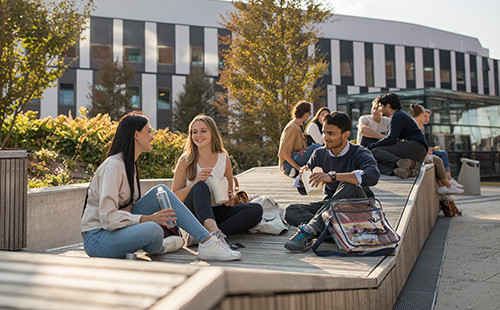Volunteering@WU
Socioeconomic status plays a major role in determining access to education and learning opportunities. Growing up in poverty greatly reduces young people’s chances of gaining a higher education later in life. The Volunteering@WU program aims at supporting young people from socially disadvantaged backgrounds and, at the same time, benefiting students by encouraging social responsibility and volunteering activities.
Within the framework of Volunteering@WU, the service learning initiative “Lernen macht Schule” is a cooperation by WU, Caritas Vienna and BILLA. In this program, WU students are encouraged to volunteer as study buddies, music buddies or sport buddies to support kids from various nonprofit institutions. German skills are required to take part in this program.
Study Buddies

Study buddies volunteer on a weekly basis in social facilities run by Caritas Vienna (i.e. accommodation for asylum seeking families, mother-child-homes, counselling centers) and the Austrian Red Cross to help children with their schoolwork, study for tests, and engage in joint leisure activities. In addition to the weekly visits, study buddies have the opportunity to participate in field trips, tours or workshops together with the kids. These activities are aimed at strengthening the relationships between the tandems and promoting the development of skills on both sides.
Music Buddies

Music buddies participate in a choir together with 20-30 children. Under the artistic direction of the Caritas initiative “Brunnenpassage,” music buddies meet with the kids once a week to rehearse for several different performances each semester. While working in a team with other students, music buddies not only support the choir director and take on organizational tasks but are also responsible for encouraging collaboration and social cohesion within the group.
Sport Buddies

Once a week sport buddies volunteer in social facilities run by Caritas Vienna (i.e. accommodation for asylum seeking families, counselling centers). Sport buddies focus on exercising and healthy nutrition and support kids in developing positive body concepts and movement experiences. Students act as supervisors and role models for a healthy lifestyle.
Training, supervision and recognition
Within all programs, students receive preparatory courses spanning several days to support them in their fieldwork. By working with the children, students not only discover their abilities, but also their limits and are challenged to develop interpersonal and social skills. Accompanying supervision and coaching sessions during the programs provide volunteers with additional support, stimulating reflection and further self-development. Continuous training seminars are available on a regular basis.
In order to evaluate learning outcomes, students keep a learning-diary and write a reflection essay at the end of their participation. Taking part in one of the programs is recognized as a free elective in WUs curriculum (3 ECTS/term). Furthermore, students are entitled to receive the WU Social Skills certificate.
Effects of participation
Building bridges between students and young people from completely different social worlds broadens the horizons on both sides and allows them to learn from each other: The beneficiaries get support in order to develop their individual interests and talents and have the opportunity to learn from positive role models. The student volunteers, on the other hand, benefit from getting to know people from different cultures and social backgrounds and are challenged to work on their own social skills and intercultural competencies. Volunteers are not only making a valuable contribution to society, they are also learning to deal with and combat complex social issues – a key skill for tomorrow’s leaders.
Numbers & Facts
Each term approx. 130 students volunteer as study, music or sport buddies and offer support to about 260 children and teens.
Since 2010 approx. 1.600 students took part in the program and carried out 159.000 hours of voluntary work.
In the past twelve years the program was honored with the Innovative Teaching Award by WU (2011) and the „Wirtschaft hilft“-Award of Fundraising Verband Austria (2019). Furthermore, it was under the finalists for the Erste Foundation Award for Social Integration (2013) and nominated twice for Ars Docendi (2015 and 2020).
